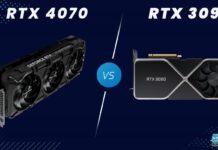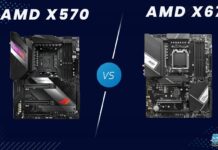AMD Ryzen 5 7640U
Rated: 8.5/10
AMD Ryzen 7 6800U
Rated: 7/10
Pros And Cons
| CPU | Pros | Cons |
|---|---|---|
| Ryzen 5 7640U | ✅ Better RAM Speeds ✅ Recent Processing Node | ❌ Lower PassMark Results ❌ Higher TDP |
| Ryzen 7 6800U | ✅ Power Efficient ✅ Higher PassMark Result | ❌ Older Manufacturing Node ❌Older PCIE Version |
- Starting, the Ryzen 5 7640U utilizes a cutting-edge 4nm process node, while the Ryzen 7 6800U adopts a less advanced 6nm process node, influencing their performance and power efficiency.
- The Ryzen 5 7640U leads with a swift base clock of 3.5 GHz, boosting up to 4.9 GHz, while the Ryzen 7 6800U competes closely with a base clock of 2.7 GHz, boosting up to 4.7 GHz, impacting their overall computing capabilities.
- Furthermore, the Ryzen 7 6800U features a configurable TDP of 15W to 28W, ensuring cooler operation. Conversely, the Ryzen 5 7640U demands a configurable TDP of 15W to 30W.
- The Ryzen 5 7640U outshines the Ryzen 7 6800U in both single and multicore benchmarks by 18.9% and 16.8% on average in our tests, respectively, showcasing its superior performance capabilities.
Comparison Table
| Key Specifications | Ryzen 5 7640U | Ryzen 7 6800U |
|---|---|---|
| Vendor | AMD | AMD |
| Release Date | May 3, 2023 | January 4, 2022 |
| Device Type | Laptop | Laptop |
| Instruction Set | x86-64 | x86-64 |
| Integrated GPU | Radeon 760M | Radeon 680M |
| Total Cores | 6 | 6 |
| Total Threads | 12 | 16 |
| L1 Cache | 64K (per core) | 64K (per core) |
| L2 Cache | 1MB (per core) | 512K (per core) |
| Transistors | 25 billion | 13.1 billion |
| Socket | FP8 | FP7 |
| GPU Base Clock | 1500 MHz | 2000 MHz |
| GPU Boost Clock | 2600 MHz | 2200 MHz |
| Cuda Cores | 384 | 768 |
| Execution Units | 6 | 12 |
Ryzen 7 6800U Vs Ryzen 5 7640U – Architectural Differences
- Process Node: Pushing innovation boundaries, the Ryzen 5 7640U thrives on a cutting-edge 4nm process node, while the Ryzen 7 6800U adopts a still-advanced 6nm process node.
- Clock Speed: Showing better speeds, the Ryzen 5 7640U takes the lead with a swift 3.5 GHz base clock and an impressive boost clock of up to 4.9 GHz, while the Ryzen 7 6800U offers competitive performance with a 2.7 GHz base clock and a boost clock of up to 4.7 GHz.
- Memory Support Variation: Setting better standards, the Ryzen 5 7640U shines with its support for DDR5-5600 and LPDDR5x-7500 memory, delivering higher bandwidth compared to the Ryzen 7 6800U’s DDR5-4800 and LPDDR5-6400 support.
- TDP: Prioritizing efficiency, the Ryzen 7 6800U excels with a configurable lower TDP ranging from 15W to 28W, ensuring cooler and power-efficient performance. Conversely, the Ryzen 5 7640U demands a configurable TDP of 15W to 30W.
- Supported Technologies: Expanding features, the Ryzen 5 7640U presents ECC Memory support, a distinctive feature not found in the Ryzen 7 6800U, catering to users seeking enhanced error correction capabilities for critical computing tasks.
In this head-to-head showdown, we delve into the laptop processors, pitting the formidable Ryzen 7 6800U vs Ryzen 5 7640U. Join us as we dissect their differences, explore their specifications, and conduct performance benchmarks, aiming to find the winner between these two processors.
Performance Benchmarks
Moving on, now we are going to take a closer look at the performance output provided by both the processors in the benchmarks tested upon by our team in terms of single-core and multicore productivity.
Cinebench R23 (Single-Core)
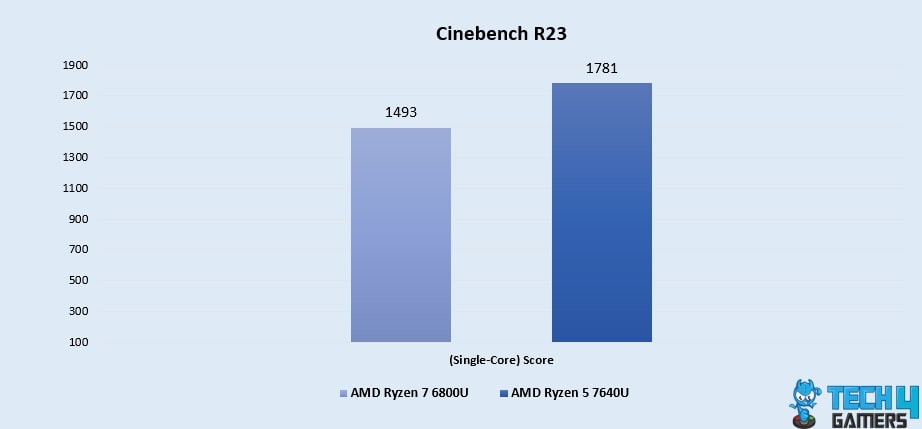
- The Ryzen 7 6800U manages a score of 1493 in our testing, while the Ryzen 5 7640U performs even better with a 19% boost, reaching 1781. It means the Ryzen 5 7640U has slightly more power when handling tasks that rely on a single core.
Cinebench R23 (Multi-Core)
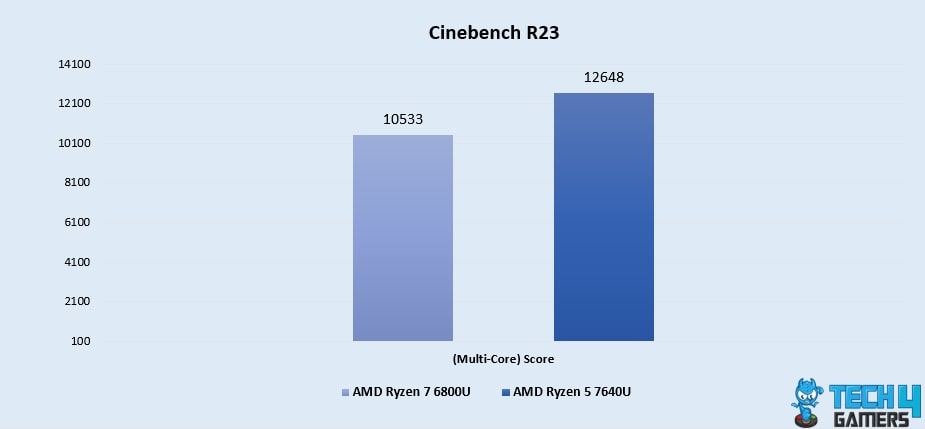
- If we talk about tackling more intensive tasks, we found the Ryzen 7 6800U scores 10533, but the Ryzen 5 7640U outshines it with a 20% higher score of 12648, showcasing its stronger multi-core performance.
Geekbench 5 (Single-Core)
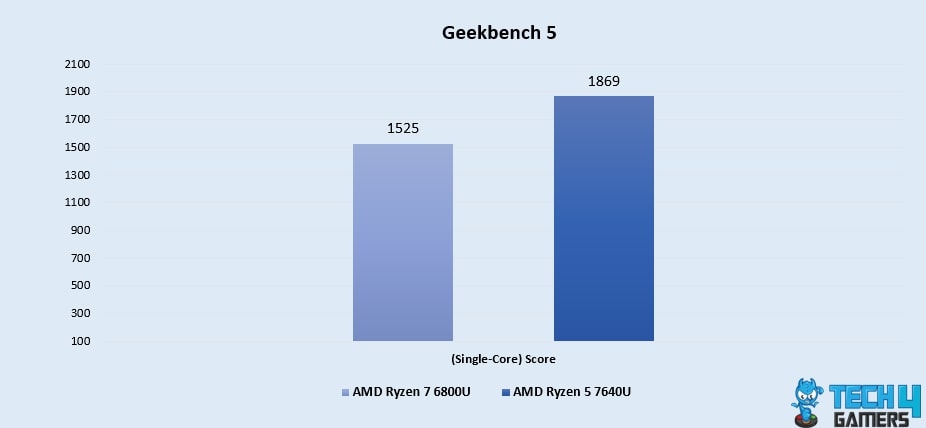
- When it comes to handling single-core tasks, our tests reveal the Ryzen 7 6800U scores 1525, while the Ryzen 5 7640U takes the lead with a 23% higher score of 1869, showing it’s a bit faster in single-core performance.
Geekbench 5 (Multi-Core)
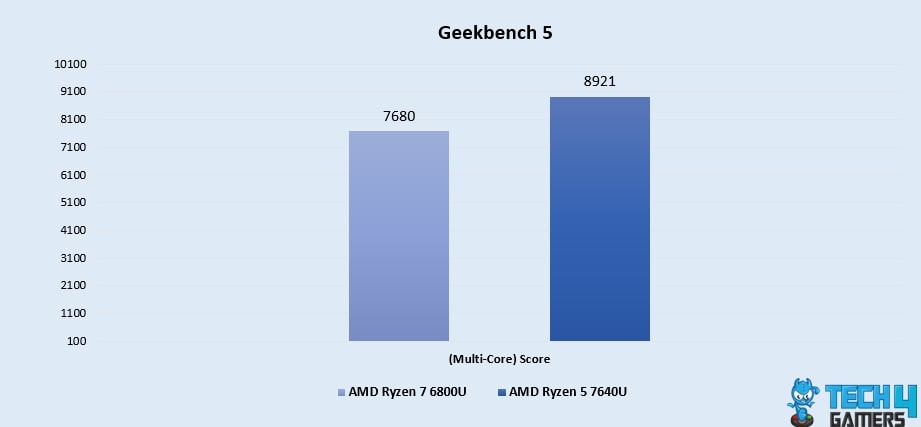
- For multitasking and handling parallel tasks, the Ryzen 7 6800U scores 7680, and the Ryzen 5 7640U gets a 16% higher score of 8921 in our benchmarking, indicating its better multi-core capabilities.
Ryzen 5 7640U vs Ryzen 7 6800U: Which One Should You Pick
AMD Ryzen 5 7640U: The Ryzen 7640U has better results on charts of our comparison in terms of single core as well as multicore tests. It offers faster clock rates, and multitasking capabilities which allow the processor to facilitate the users in performance.
AMD Ryzen 7 6800U: The Ryzen 7 6800U has an older processing node of 6nm, which results in lower speeds and therefore lower result quality in benchmarks. The processor showcases a similar but better TDP range which tilts the power efficiency scales towards it. But the performance of the processor nevertheless remains low and inferior.
After conducting our complete benchmarking tests, we recommend choosing the Ryzen 5 7640U for significantly better performance in both single and multicore benchmarks. With faster clock speeds, it offers enhanced computing capabilities and multitasking efficiency, making it the preferred option for an optimized user experience.
More From Ryzen 5 7640U:
More From Ryzen 7 6800U:
Thank you! Please share your positive feedback. 🔋
How could we improve this post? Please Help us. 😔
[Comparisons Expert]
Shehryar Khan, a seasoned PC hardware expert, brings over three years of extensive experience and a deep passion for the world of technology. With a love for building PCs and a genuine enthusiasm for exploring the latest advancements in components, his expertise shines through his work and dedication towards this field. Currently, Shehryar is rocking a custom loop setup for his built.
Get In Touch: shehryar@tech4gamers.com



![Ryzen 9 7900X3D Vs Core i7-13700K [7 Games Tested] Ryzen 9 7900X3D Vs Core i7-13700K](https://tech4gamers.com/wp-content/uploads/2023/07/Ryzen-9-7900X3D-Vs-Core-i7-13700K-218x150.jpg)
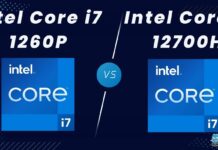
![RTX 4070 Ti Super Vs RTX 3090: Worth Upgrading? [Tested]](https://tech4gamers.com/wp-content/uploads/2024/03/4070-ti-super-vs-3090-featued-image-218x150.jpg)
